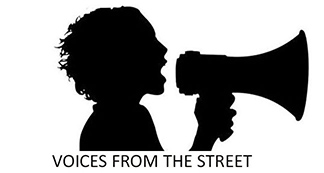Joe Fiorito
May 8, 2006
The mentally ill have been to places we cannot imagine. Or, if we have very good imaginations, or plenty of relatives, or if our circle of acquaintance is wide enough, then we know they have been to places that scare us silly.
We fear them. Our own grip is tenuous enough. We turn away when we ought to listen.
They have stories to tell.
I had lunch with a handful of psych survivors the other day. Telling stories is their habit and, now that they have formed the Toronto Homeless Speakers Bureau, it is also their job. I did not eat much lunch. I find it hard to eat with my ears wide open.
One man talked about the time he was fighting evil in the park, using St. Michael’s sword and the crown of Jesus. He also had the help of his dad, who was not physically present.
You try explaining that to the cops.
And one woman spoke of how she escaped an abusive husband and buried her memory of him by digging graves in her back yard; five graves in all. Her neighbors thought she was landscaping, and what a hard worker and fine gardener she was, turning over the soil like that.
If the neighbors only knew.
Why are the survivors keen to tell such stories?
Cheryl grew up in a succession of foster homes. Her mother and grandmother also had mental illness. She recalled the kindness of a social worker who had the habit of leaving a candy – a humbug – on her pillow at night.
She said, “I had a rough start, coming from the street. What I have to say might benefit others. If it helps, it will give me a sense of worthwhileness.”
And so they have told their stories to nuns and social workers and to the public at large. Their aim is also to hit the colleges and universities and speak to students of psychiatry and social work, in order to reach those people before they get degrees or diplomas, and….
Wait a second.
Nuns?
Glen said, “I told the nuns what it was like when I get on a high.” He did not mean stoned. He meant that, on occasion, his moods are wildly elevated.
What’s that like, talking to a group of women who might not be familiar with the finer points of life on the street, or familiar with the ins and outs and the ups and downs of mental disorder?
“I told them being on a high was like being on acid. They didn’t know what that meant. So then I said, you know, it’s like when you get very drunk. They didn’t know what that meant, either.”
Glen savoured the memory. “I guess I have to work on explaining that. But it gave them an understanding of what a person is like when he’s on a high. So they know it’s a human being there. So they know they can care for anyone.”
Glen is on meds now. His arm twitched. I noticed. He said the twitch was a side effect of his meds. That’s what happens with certain of the chemical controls – you get a main course of stability, with a side order of twitching.
Cheryl underlined the point.
She said, “I was on Prozac for 15 years solid. I was mumbling, grunting, getting twitches in my face. The doctor took me off it. Those effects disappeared.”
She’s lucky. Her doctor listened. Not all of them do.
Emily said, “My diagnosis is paranoid schizophrenia. I’m not stupid. If you put me in a room with schizophrenics, it’s like a language; I get it. But the treatment all sounds like ‘Get away from me, you schizophrenic.’”
Emily said that she’d gone with Glen to talk to the nuns. “I gave them my standard rant, but I left the Virgin Mary behind.”
What’s Mary got to do with it?
Emily had been stuck in a bad marriage. Her husband was abusive. He broke her jaw. Emily felt she couldn’t leave him because she was Catholic, and they had kids. She began to feel that whatever was wrong was her fault, and there was nothing she could do.
And then it all came apart.
“I thought if I was the Virgin Mary, he wouldn’t hurt me. If I was Mary, then the kids were Jesus and, well, who’d want to hurt the mother of Jesus?”
Put it like that, and it sounds sort of logical.
Emily got treatment. The doctors gave her big drugs. There were unintended consequences. She pleaded with them. “You say you can’t swallow; they say be careful. You are twitchy, drooling, peeing your pants; they say you have a choice – you can be mentally stable or physically healthy; you can’t be both.” Some choice.
What’s the answer?
Listen closely.
Credit: Toronto Star
